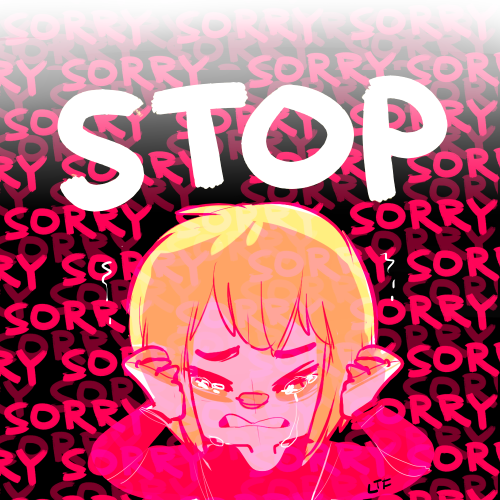narumitsu-lawlu:wingsonghalo: marithlizard: heir-of-the-founders: apologieslogan: youreawizardsophie
narumitsu-lawlu:wingsonghalo:marithlizard:heir-of-the-founders:apologieslogan:youreawizardsophie:inner—utopia:ask-rainy-water-princess:genocidershodan:lemonteaflower:anxiety.Or, you know, you could just stop saying sorry.I take it you don’t have anxiety.You can’t “just stop saying sorry”. You do something, something so little, like accidentally bump into someone. You feel horrible about it. Your brain starts panicking and you have trouble trying to breathe. You stutter an apology. They say it’s okay, but you accidentally do it again, and you apologize again. They just say “Aha, you can stop saying sorry.” And you feel horrible that you’ve probably made them angry or upset, so you mutter out an apology for the third stupid time, and they just say to stop saying sorry. Stop saying sorry. You can’t just tell someone to stop saying you’re sorry.…Wow. I’m usually the one that tells people to stop saying sorry. I actually learned something on Tumblr, thanks!my best friend does this all the time. might I suggest that instead of telling people “stop saying sorry” to tell them something a little softer like “no need to apologize!” or “no worries”? I know the last one sounds a little contradictory for someone with anxiety, but as someone with anxiety, even small reassurances that it’s okay mean everything to me.I usually say something like “its okay, you didnt do anything wrong” if the apology seems like it comes out of nowhere. I’ll also ask what they think they did wrong and reassure them about that.This! If you get angry at someone for apologies and other forms of self-deprecation, you’re not only making them feel worse but sending a strong signal of rejection. “I’m not responsible for your obvious mental problems and don’t want to have to see them, if you can’t behave acceptably don’t be around me.” It’s an effective way to make someone avoid you whenever possible and cringe inside when they can’t, if that’s what you’re after. If you actually want to support the person, reassure them instead. It can be a simple rote thing like “it’s okay” or “no worries”, as other people have suggested; you’re not responsible for ‘fixing’ them or discussing the behavior. Make a reassuring noise and move the conversation on. The more I practice social conversation with strangers, the more I settle in to thinking that much of our verbal communication is like bird calls - the word content doesn’t matter, we’re pinging signals back and forth, and repetition is common. Are you there? I’m here. Are you friendly? I’m friendly. I’m scared? It’s okay. “I’m not responsible for your obvious mental problems and don’t want to have to see them, if you can’t behave acceptably don’t be around me.” YES. THIS IS IT, THIS IS WHAT I HEAR WHEN PEOPLE TELL ME TO STOP SAYING SORRY. Also if they tell me to “just drop it” or “stop putting yourself down.” This children is something you have to absolutely stop doing. It make indeed the other person feels even worse. -- source link
Tumblr Blog : lemonteaflower.tumblr.com
#comic#anxiety#apologizing#queuel beans



